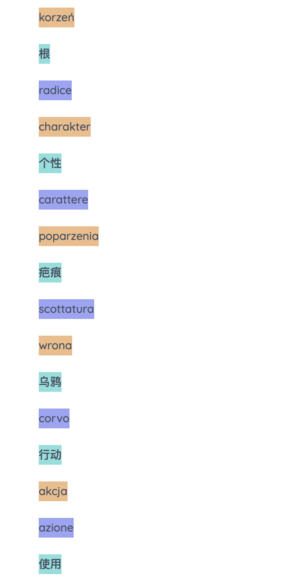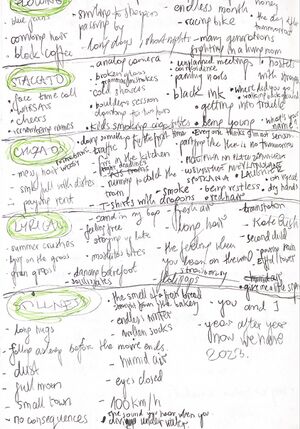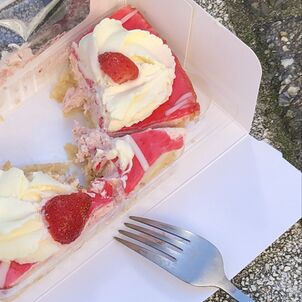User:Mania/Special Issue 22/Radio Worm: Difference between revisions
(Created page with " Movement Movement is a mode of communitation. We move and express ourselves with our bodies before we use words. Consider how important body language was in silent movies or in acient theater. Our online presence is increasingly nonverbal and video-based these days. The signs and gestures on tik tok - its like a new language. Power of body language is crucial in telling stories. So here rise the question: can movement speak to us? But in order to see the movemen...") |
(→Week 2) |
||
| (12 intermediate revisions by the same user not shown) | |||
| Line 1: | Line 1: | ||
== ''Week 2'' == | |||
'''Movement''' | |||
[[File:Listofwordsinourlanguages.png|thumb]] | |||
Movement is a mode of communitation. We move and express ourselves with our bodies before we use words. Consider how important body language was in silent movies or in acient theater. Our online presence is increasingly nonverbal and video-based these days. The signs and gestures on tik tok - its like a new language. Power of body language is crucial in telling stories. | Movement is a mode of communitation. We move and express ourselves with our bodies before we use words. Consider how important body language was in silent movies or in acient theater. Our online presence is increasingly nonverbal and video-based these days. The signs and gestures on tik tok - its like a new language. Power of body language is crucial in telling stories. | ||
| Line 19: | Line 20: | ||
What is our intention for this audition???? | '''What is our intention for this audition????''' | ||
Our intention is to reflect on movement and its unexpected uspects, therefore implying a continusos change. We want to shed some light on the topic of authorship that will link all of the sections together. | Our intention is to reflect on movement and its unexpected uspects, therefore implying a continusos change. We want to shed some light on the topic of authorship that will link all of the sections together. | ||
| Line 26: | Line 27: | ||
'''5 Rhytms''' | |||
[[File:Notes111.jpg|thumb]] | |||
The way we wanted to devide the audition into sections was inspired by Gabriel Roth's %Rhytms concept. She was an American dancer and musician She overcame depression and injury to create the 5Rhythms approach to movement in the late 1970s; there are now hundreds of 5Rhythms teachers worldwide who use her approach in their work. Her vision was to spread dance across the world, using the power of movement to heal body and spirit. The 5Rhythms movement system, founded by Roth, focuses on five body rhythms: flowing, staccato, chaos, lyrical and stillness and is "a way to become conscious through dance". | The way we wanted to devide the audition into sections was inspired by Gabriel Roth's %Rhytms concept. She was an American dancer and musician She overcame depression and injury to create the 5Rhythms approach to movement in the late 1970s; there are now hundreds of 5Rhythms teachers worldwide who use her approach in their work. Her vision was to spread dance across the world, using the power of movement to heal body and spirit. The 5Rhythms movement system, founded by Roth, focuses on five body rhythms: flowing, staccato, chaos, lyrical and stillness and is "a way to become conscious through dance". | ||
'''n e w m e a n i n g s''' | |||
we celebrated with a cake | |||
[[File:Celebration cake.jpg|thumb|302x302px]] | |||
Latest revision as of 11:22, 1 October 2023
Week 2
Movement
Movement is a mode of communitation. We move and express ourselves with our bodies before we use words. Consider how important body language was in silent movies or in acient theater. Our online presence is increasingly nonverbal and video-based these days. The signs and gestures on tik tok - its like a new language. Power of body language is crucial in telling stories. So here rise the question: can movement speak to us?
But in order to see the movement and perceive it we need space. Think about dance, its a form of art that when its finished it doesnt leave a physical mark.
How can we translate movement to a non visual space? How can we sharpen other senses and use radio as a tool to experience continous change?
Movement doesnt refer only to the body, it is applicable to everything that is around us, constantly changing and evolving. It is an element that represent change.
We will refer to movement in a broad context; from body movement, through languages that are ever-evolving to nonhuman ecologies.
What is our intention for this audition????
Our intention is to reflect on movement and its unexpected uspects, therefore implying a continusos change. We want to shed some light on the topic of authorship that will link all of the sections together. "Death off the autor" According to Roland Brthes in the essay "Death off the autor "writing is a performative act that exists only at the moment we read the words on the page, because that is the only moment when those words truly take on meaning–and their meaning is given by us who interpret them. We will use the text as an element for our interaction with each other and create new meanings. The content has been thought of in a dynamic way, fluctuating outside its bondaries. Our separate perceptions and origins will flow and blend creating new interpretations and meanings.
5 Rhytms
The way we wanted to devide the audition into sections was inspired by Gabriel Roth's %Rhytms concept. She was an American dancer and musician She overcame depression and injury to create the 5Rhythms approach to movement in the late 1970s; there are now hundreds of 5Rhythms teachers worldwide who use her approach in their work. Her vision was to spread dance across the world, using the power of movement to heal body and spirit. The 5Rhythms movement system, founded by Roth, focuses on five body rhythms: flowing, staccato, chaos, lyrical and stillness and is "a way to become conscious through dance".
n e w m e a n i n g s
we celebrated with a cake



